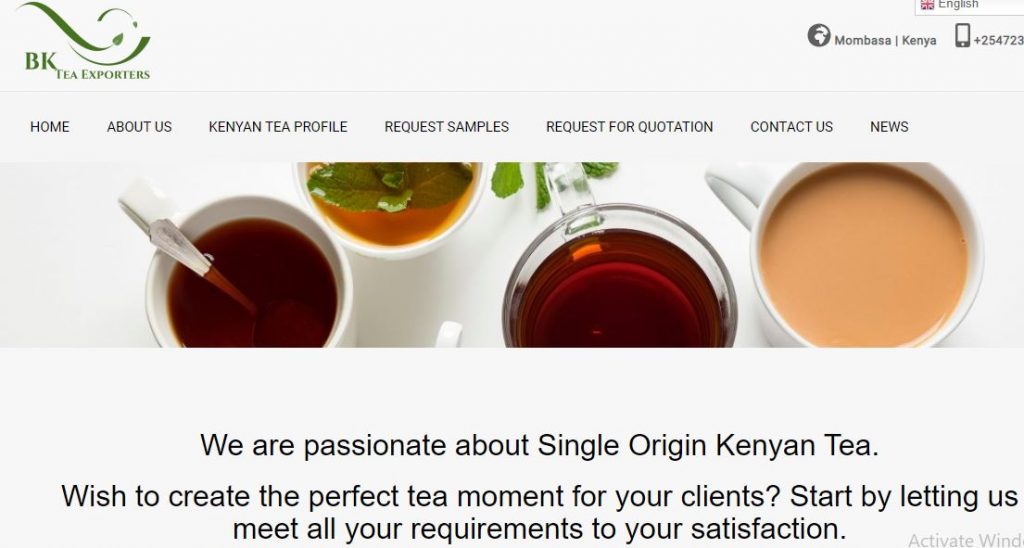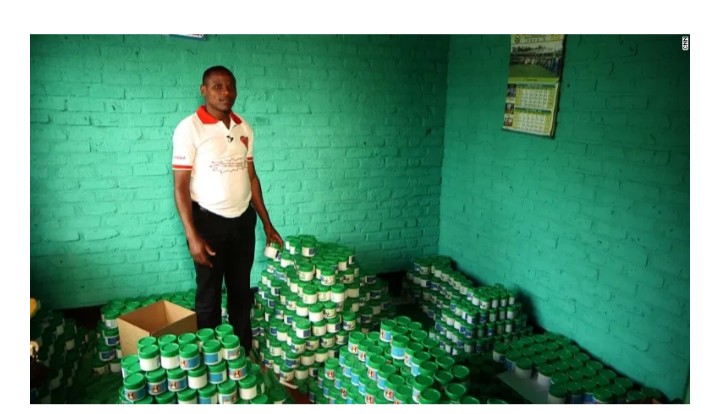Interview: How Christine Simon is Promoting Kenya’s Tea Industry
Tea is a major cash crop grown in Kenya, and it has been the leading major foreign exchange earner for the country.
Since tea was introduced in the country in 1903, it has since grown to be the world’s largest Black Tea exporter.
This heritage is what Christine of Buy Kenyan Tea has fallen in love with, and she’s going out of her way to see the industry grow beyond what it is.
Christine Simon is the Founder and CEO of Buy Kenyan Tea Exporters, a company set up to help promote Kenyan Tea and help people learn and enjoy the great benefits that comes with consuming Kenyan Tea.
In an exclusive interview with Founders Africa, Christine takes us on a tour on her journey so far, what inspired the idea and her future plans to expand the business.

Tell us a little about yourself
I’m a professional Marketer whose pride and joy is marketing my country’s leading export crop! I’m hoping to leave a small footprint in the tea industry by exploring new global and evolving opportunities for Kenyan single origin tea.
Tell us about Buy Kenyan Tea and the solutions you provide
Two things:
First, we’re a marketing company that’s centred on expanding the awareness of Kenyan tea and its unique flavour profile. Just like wine, tea from different countries will have its own taste, flavour, aroma and other characteristics based on the terroir, climate and altitude of that region. The majority of Kenyan tea is usually bought from the Mombasa auction and blended alongside other teas from tea producing countries such as India and Sri Lanka.
The blends by different international buyers are curated into different brands, which end up in supermarket shelves in different parts of the world.
The majority of Kenyan tea is usually bought from the Mombasa auction and blended alongside other teas from tea producing countries such as India and Sri Lanka.
The blends by different international buyers are curated into different brands, which end up in supermarket shelves in different parts of the world.
Because of the blending process, we lose the awareness of origin, as most consumers aren’t familiar with Kenyan tea like they are with Sri Lanka’s Ceylon and India’s Darjeeling and Assam teas.
Our main line of business is creating partnerships with other passionate tea connoisseurs, acknowledging the unique flavour profile of unblended Kenyan tea and marketing it to consumers.
Second, I also wanted to create a platform that would make the tea trading as smooth as possible for the buyer. Importing any type of product is at times demanding as you need to ensure your supplier fully understands your needs.
This is magnified when it’s a commodity that involves a significant amount of risk and so I wanted buyers to understand how important it is for us to meet their requirements so that they can have peace of mind in the buying process.
By partnering with an exporter who shares this sentiment, we’ve been able to identify concerns, weaknesses and put beneficial measures into place.
What inspired the idea for Buy Kenyan Tea?
I grew up on a tea farm in an area called Limuru, where I first fell in love with tea. The history of Kenyan tea dates back to 1903 in this very same region. As a child the tea farm my father managed was nothing more than a lush field to play and run around in but it had a lasting effect on me.
Years later, I ended up in Mombasa where one of the largest tea auctions is held on a weekly basis and I realised I was where I needed to be if I was ever going to stand a real chance to succeed in the tea industry.
What’s the greatest challenge you encountered when you started out?
There were several comments from well-established people in the industry who would say that there was nothing new to market about Kenyan tea.
I respected their opinion and can understand their sentiments. Kenyan Tea has been traded since pre-independence and over time we’ve established traditional and predictable bulk tea markets such as Pakistan, Egypt, and UK.
But I realised there were many other niche markets that would benefit from private labels, and unique artisan teas like orthodox, purple and white teas.
It comes down to doing your research on the global market and when you offer a product that meets evolving consumer preferences, then I’m of the opinion that there’s no limit to how far your reach can be.

Tell us about your entrepreneurship journey
I’ve dabbled in trying to distribute an existing Kenyan tea brand in the UK and realised that as it’s a ripe market where you have many well established brands, it became difficult to convince mainstream retailers to stock a brand that didn’t bring anything ‘new’ to the table. I considered this a ‘failure’ at the time and naturally retreated from the tea sector until the bug caught up with me again in 2018.
There will be ups and downs as cliché as it sounds and so I would urge anyone who finds themselves in the same position as I did to develop the emotional maturity to pick yourself up and really evaluate the setbacks and what you can do differently next time.
What’s your most exciting moment as an entrepreneur?
So far it’s been reaching out to markets that aren’t traditionally Kenyan tea export markets and seeing positive reactions and interest for our tea.
It’s also been rejuvenating having something close to my heart be the subject for my career and feeling a huge sense of responsibility on how this pans out.
This year, it’s been great to be featured on Founders Africa and on an upcoming August feature by the Tea and Coffee Trade Journal.
How has the pandemic affected your business and what are you doing to adjust and adapt to the current times?
Surprisingly during the lockdown, I’ve found that my target market (purchasing managers and buyers) were more inclined to respond to me – perhaps they simply had more time on their hands to log onto LinkedIn!
Personally, the period has made me even more focused with my goals and hence I was able to take small steps that have been making a positive difference. I say this with a lot of humility given how COVID-19 continues to wreak havoc to so many lives and businesses.
The food industry in Kenya is quite big and still growing, how do you set yourself apart from competitors?
My business for now is very much export centered but one thing that cuts across the board is that the type of product and service you provide is what will always differentiate you.
There are so many businesses offering the same things that you are, but when you truly care to offer solutions and build relationships that aren’t short sighted then you’ll tend to achieve more mileage than those who don’t.
What are the future plans for Buy Kenyan Tea?
I’m very fascinated by branding and so would absolutely love to build a Kenyan tea brand from scratch. I’d also love to become an exporter myself once I’m able to qualify and build my business to that level.
From your experience as an entrepreneur, what advice would you give young African entrepreneurs who are just starting out?
A short statement from my father has always guided me – “Start with a bang” and maintain consistency. I procrastinated for a very long time because I knew deep down it wouldn’t be easy and I wasn’t ready to face rejection again for something that I felt so passionate about.
Rejection is a huge part of life and I think training yourself (with resources – some available online) to handle rejection and fear is a huge step in getting to do what you’ve always wanted to do.
Also, if you can, get yourself a mentor who’ll guide you and give you a head start on how to do things, this will make you avoid certain mistakes that would otherwise slow your progress.
Also network. I know some people find networking challenging and so I’d encourage everyone to be able to communicate (in the shortest time) what it is that they do and what kind of solutions they offer.
Try to become a ‘solution’ voice of authority in your industry and whenever someone is ready to make a purchasing decision, they’re more likely to gravitate towards you than someone who didn’t make an effort to educate them on a solution to their problem.




